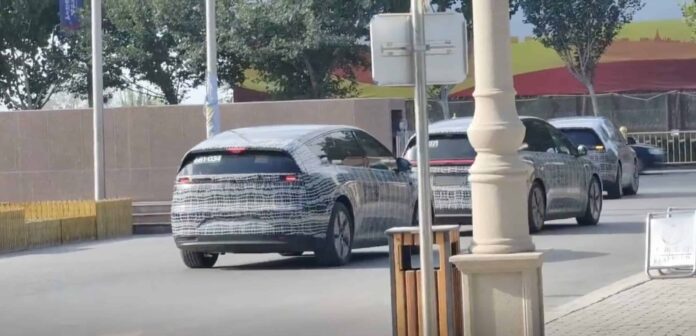Original plans called for releasing four all-electric Li Auto cars this year. Only one of these, the Li Mega, has launched. The other three, all SUVs, have been delayed until next year. Believed to be called M7, M8, and M9, all three have been snapped together for the first time. The spy shots are from the rear, but we can still get some idea of the differences between the three models.
The spy shots show the three cars exiting a facility onto the road. Fast Technology claims it looks like Turpan in Xinjiang province. This would mean the cars are there for hot weather testing.

What’s not clear is whether the cars are actually in size order. However, it definitely looks like the rear car is the smallest, and so it’s likely the M7. Meanwhile, the lead car is the same vehicle as in an official shot from Ben Baum, senior design director of Li Auto, last month. This, at the time, was believed to be the M8 model. However, from the spy shots, it is unclear whether the middle or the lead car is, in fact, larger. We’re inclined to believe the car previously believed to be the M8 is actually the M9.

And if the model lineup does indeed go this way, it seems that as the numbers go up, the car looks increasingly more like the Mega. The M7 seems significantly smaller than the other two cars and clearly has a roofline that rakes down to the back at a much steeper angle, resulting in a significantly smaller rear windshield. With the Li Auto L series of extended-range EVs, there is little difference other than size in the looks of the four models. This doesn’t appear to be the case with the M series, where there seems to be more variation. From the spy shots, the rear lights look different, although this could possibly just be due to the camouflaging. What we can be more certain about is that the rear contours are definitely different.
The Li Mega (see specs) for an MPV has an amazingly low drag coefficient of Cd 0.215. It is likely that the new SUVs will also be similarly slippery, thereby helping with range.

Officially, the reason for the delay in the launch of the three SUVs has been that Li Auto wanted to delay them until the supercharging network was complete so that customers could have a better charging experience. Like the Li Mega, the three new SUVs are believed to have 5C charging capability. In the case of the Li Mega this means the car can charge from 10 to 80% in 10 minutes and 36 seconds with a 5C charger.
Currently, Li Auto has more than 700 supercharging stations with a total of more than 3260 actual chargers. Plans call for the building of more than 2000 stations by the end of the year.
Another reason Li gave for the delay was that stores supposedly need multiple models to occupy space. This seems a rather strange reason given that the L series already exists, and so does the Mega. More likely, the reason is the Mega and the poor sales it has so far experienced, which are well below what the company expected.
Sources: Fast Technology, Autohome,


